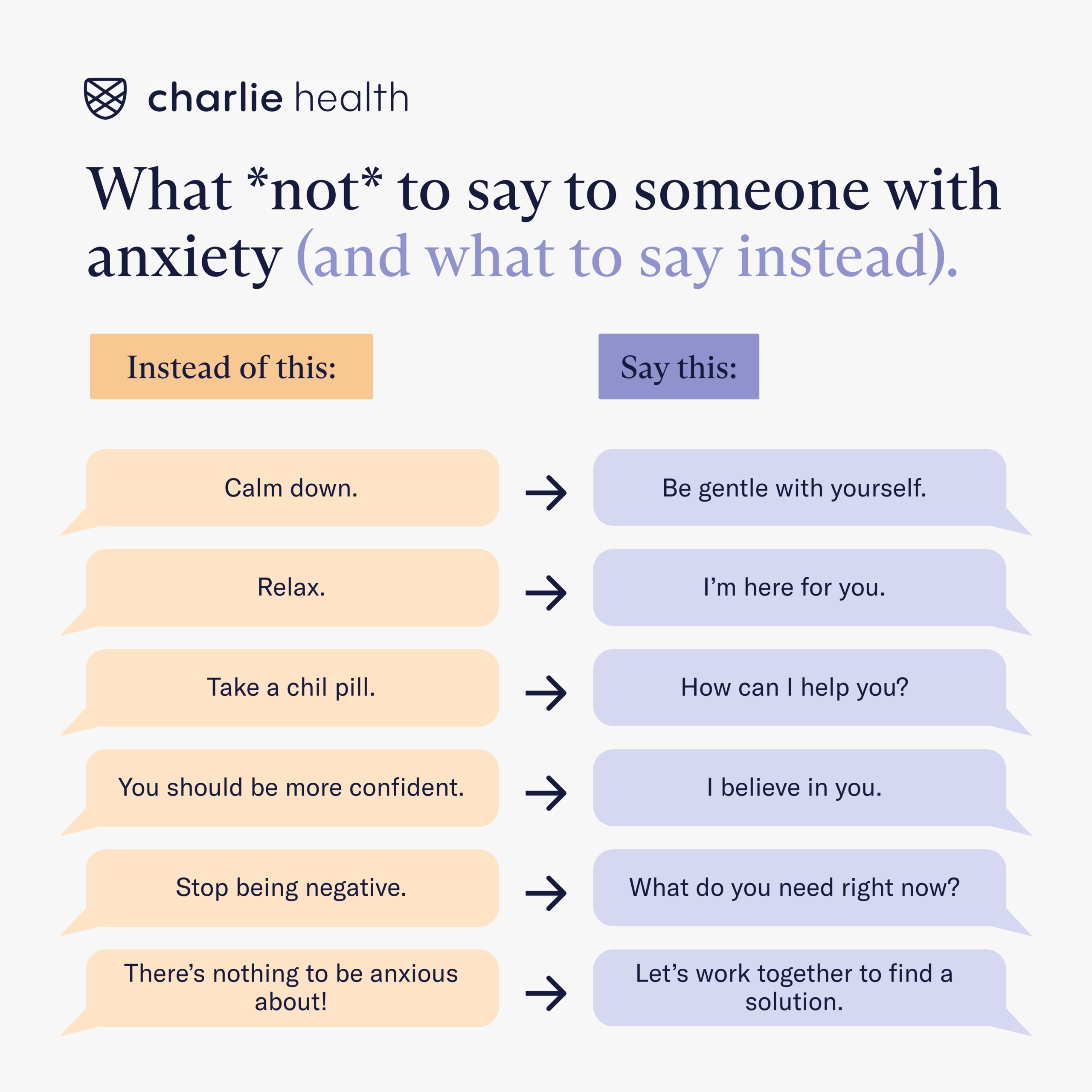
Table of Contents
Here’s What Not to Say to Someone With Anxiety

Written By: Eleanor Blaine

Clinically Reviewed By: Dr. Don Gasparini
January 8, 2024
5 min.
Five therapist-approved tips for staying curious, offering empathy, and using validating language when talking to someone with anxiety.
Learn more about our Clinical Review Process
Table of Contents

People with anxiety disorders tend to overthink and have an increased sensitivity to words or triggers, which can make communication challenging. “Our words hold power, and often, people who struggle with intense anxiety internalize those words a bit more deeply,” says Asha Clark, LPC, a Charlie Health Primary Therapist specializing in anxiety. “People with anxiety can be more sensitive to what others have to say.”
Anxiety, though, is common: data shows that nearly one-third of teens suffer from an anxiety disorder, and roughly the same amount of adults have been diagnosed with one during their lives. This means that someone in your life is likely dealing with anxiety, and you’ll probably need to learn how to communicate with them.
The good news is that some education, patience, curiosity, and compassion can go a long way when communicating with someone with anxiety. Below, we delve into therapist-approved tips for what not to say to someone with anxiety—and actionable steps you can take to help them.

We’re here to help your loved one
Virtual, intensive care for anxiety without a waiting list.
5 things not to say to someone with anxiety
It’s difficult to witness anxiety in someone you love, and even more challenging when their anxiety makes communication challenging. And the stakes here are high: saying the wrong thing might worsen feelings of worry or fear during a crisis or anxiety attack.
While it’s not your job to resolve the underlying issues contributing to a loved one’s anxiety (that’s where a mental health professional comes in), it is important to communicate with patience, says Clark. Below are five things you should not say to someone dealing with an anxiety disorder.
1. “Calm down,” “relax,” or “take a chill pill.”
Although it may seem reasonable to you, telling someone with anxiety to calm down is not an effective strategy. At best, it may feel invalidating or condescending; at worst, it could trigger a panic attack. Using this language implies an anxious person’s feelings are invalid. This can make them feel like you’re not taking their anxiety seriously or don’t understand what they’re going through, which can actually increase anxious feelings.
Also, simply telling someone with anxiety to calm down demonstrates an incomplete understanding of anxiety—it’s like telling someone with a broken arm to “just walk it off.” “Anxiety isn’t a switch you can simply turn off,” says Clark. “An anxious person can’t just stop being anxious. It doesn’t work like that.” In reality, anxiety is a mental health condition that often requires professional support.
Try not to be dismissive of your loved one’s suffering, even if you may struggle to understand what they’re going through or see their fears as irrational. Remember: telling someone to relax doesn’t make their anxious thoughts any less real. Instead, try empathizing with what they’re going through.
2. “You should be more confident.”
“I hear this one a lot from clients who are struggling with anxiety in the workplace,” says Clark. “The problem is that people who have anxiety are plagued with self-doubt. Self-doubt is a major symptom of anxiety.”
Supervisors or others who use this kind of language may think they are being empowering. However, telling someone with anxiety to be confident doesn’t speak to underlying issues affecting their confidence, such as lack of experience, imposter syndrome, or fear of failure.
This kind of advice can be counterproductive, as it may make the person feel like their lack of confidence is a personal failing rather than a regular part of the learning process. “Instead,” says Clark, “work collaboratively with an anxious person to identify ways to build their confidence.”
3. “Stop being so negative” or “be positive.”
Anxious people are more inclined towards negative thinking and rumination, which can be a complicated pattern to break. “When it comes to anxiety, we tend to listen to the negative voice more,” Clark explains. However, the solution to seeing beyond this negative voice isn’t as simple as being positive. As Clark has pointed out, anxiety is not a switch that can be turned on or off.
Positive affirmations have been shown to help with anxiety, increase self-esteem, and make the person feel less threatened, but only if the person saying them can internalize the messaging. So, if someone is open to it, this may be a good strategy to try.

CBT Journaling Can Help You Deal With Negative Thoughts
Charlie Health Editorial Team
4. “Just breathe.”
“Breath is absolutely a tool in relieving anxiety,” says Clark. “But it’s not a one-size-fits-all- solution and may not be effective for everyone.” Instead, consider asking someone with anxiety if there’s a coping mechanism that they like to use. This could include breathing exercises, mindfulness practices, or other techniques for managing anxiety. Some techniques that Clark specifically recommends are the boxed breathing technique or the 5-4-3-2-1 mindfulness exercise.
5. “Why are you anxious? There’s nothing to be stressed about!”
A common misconception about anxiety is that it only happens when someone is dealing with stressors. While it is the case that certain situations, such as social situations or life changes, can lead a person to develop anxiety, it is also true that anxiety can happen when a person’s life is full of so-called good things.
In reality, there are many causes of anxiety beyond life events, like genetics, environment, and neurological factors. It’s important to consider these factors when supporting an anxious person. Instead of suggesting someone’s seemingly positive life experiences negate their negative emotions, try validating the anxious feelings that they’re sharing with you.

Helpful things to say to someone with anxiety
Instead of using the above statements, try to offer support and validation when talking to someone with anxiety. Here are some phrases that may help you communicate more effectively with someone with anxiety:
- “I’m here for you.”
- “I understand that you’re feeling anxious.”
- “What can I do to help?”
- “What do you need right now?”
- “Let’s work together to find a solution.”
- “I believe in you.”
Also, instead of suggesting that a loved one’s anxiety will resolve on its own, consider helping them connect with necessary mental health resources. For instance, you could encourage them to reach out to a mental health professional—and even support them in doing so if they want your help.
Anxiety treatment at Charlie Health
If anxiety symptoms are impacting your mental health, Charlie Health is here to help. Charlie Health’s virtual Intensive Outpatient Program (IOP) provides more than once-weekly mental health treatment for young people dealing with complex mental health conditions, including clinical anxiety. Our expert clinicians incorporate evidence-based therapies into individual counseling, family therapy, and group sessions. With treatment, managing your anxiety symptoms is possible. Fill out the form below or give us a call to start healing today.




